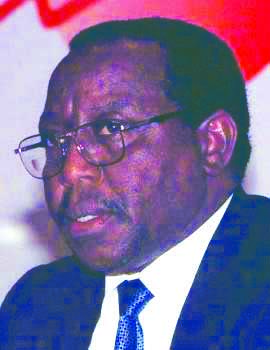


 BULAWAYO — The country’s major political players are descending on the second city ahead of elections in desperate attempts to swing the pendulum in their favour in the wake of discontent among residents over the performance of the inclusive government.
BULAWAYO — The country’s major political players are descending on the second city ahead of elections in desperate attempts to swing the pendulum in their favour in the wake of discontent among residents over the performance of the inclusive government.
Bulawayo has been a stronghold for Prime Minister (PM) Morgan Tsvangirai’s party since its formation in 1999.
The labour-backed party roundly swept all the major seats in Bulawayo in the 2008 synchronised elections.
With elections due before July 31, a scramble has clearly ensued for Bulawayo, the hub of the Matabeleland province.
Signalling the intense showdown for Bulawayo, five party bigwigs from ZANU-PF namely Simon Khaya-Moyo, the national chairperson; Webster Shamu, the national political commissar; Sydney Sekeramayi, the secretary for security; Didymus Mutasa, the secretary for administration; and Obert Mpofu, the secretary for economic affairs have been out to make their party’s presence felt in the city.
PM Tsvangirai was also in the City of Kings on a three-day visit as he sought to tighten his grip on Bulawayo in the face of an intensifying scramble for votes by rival political parties.
Not to be outdone, Simba Makoni — leader of Mavambo/Kusile/Dawn (MKD) — also ran a parallel programme to that of the Movement for Democratic Change (MDC-T) leader.
The entry of new political contestants in the form of Welshman Ncube, leader of the smaller MDC faction and Dumiso Dabengwa of ZAPU looks threatening to the MDC-T’s dominance in Bulawayo.
While the restructured ZANU-PF provincial executive is racing against time to re-gain its long-lost dominance, the MDC-T appears to be enjoying an upper hand over its rivals because it is the only party so far to have conducted primary elections to nominate candidates to stand in the national elections.
Albert Mhlanga, the MDC-T’s provincial organising secretary, said his party has made a head start ahead of competition and was looking at maintaining its clear advantage going into the general elections.
During his three-day visit, PM Tsvangirai held closed-door meetings with white farmers, civic society leaders, trade unionists and the MDC-T’s provincial executive.
Sources said the MDC-T leader sought to explain his policies in the wake of a policy conference held by his party in Harare last month.
“The MDC-T is a pro-poor party and the PM is a social democrat and that is why he wanted audience with all these different stakeholders and he opted for that without the glare of the media,” said a source.
In his address to civic society leaders, PM Tsvangirai was quick to back devolution, an emotive issue within the three Matabeleland provinces.
“It is always an issue, the issue of a devolved state. This Constitution actually provides for a devolved state…the principle is good, a devolved state is good to deal with the national question,” said PM Tsvangirai.
“The national question has always been about equity and recognising that no Zimbabwean must be given a second class citizen status. Many countries in the world now have a devolved state because of marginalisation. It is a genuine, justifiable expectation and I am glad that the new Constitution captures this.”
PM Tsvangirai also pointed out that his MDC-T party was exhausting all efforts to deal with the various challenges faced by Bulawayo that include water shortages and de-industrialisation.
“We need Bulawayo to be the industrial hub of the country. These are the issues that any future government must deal with,” he said.
Makoni’s election campaign got off to a rocky start in the city, as he came under criticism for being “invisible” in the face of an offensive from other political parties and only re-surfacing in the region towards election.
In 2008, Makoni broke away from ZANU-PF to challenge President Mugabe in the presidential race and garnered eight percent of the vote. The bulk of Makoni’s support was from the Matabeleland province.
Makoni, however, denied being invisible and said his party faced resource constraints and poor coverage from the media, which made it appear as if it was a non-entity in the country’s political discourse.
“MKD is wholesomely visible in Bulawayo; we have 12 constitutional districts that all have members who are filling all positions in those structures. We might not be visible in the media, but on the ground we are visible,” said Christopher Mungofa, the MKD Bulawayo provincial chairperson.
Rugare Gumbo, the ZANU-PF national spokesperson, said the revolutionary party would not be intimidated by its rivals and would be riding on its wealth of experience to recover lost ground in the Matabeleland provinces.
Nhlanhla Dube, the spokesperson of the MDC, said it was strategic for his party to delay the selection of candidates.
Dumisani Mpofu, a political analyst, said the intense rush into Matabeleland was a result of the realisation that the region commanded a swing vote and previous voting patterns had shown that they usually voted unanimously for candidates.
“ZANU-PF realises that Matabeleland is a reliable region to invest upon as they tend to vote unanimously. This is the swing vote and whoever swings the Matabeleland vote in their favour can win the Presidential election,” said Mpofu.
Thomas Sithole, a political commentator, said results in the last elections held in 2008 had shown that Bulawayo residents had cast a “protest vote” which favoured the MDC-T.
The MDC-T’s performance in the unity government had placed it under scrutiny and immense pressure, raising the likelihood that voters might now cast their vote for individuals and not for parties.
“This coming election, the voters have become smarter and strategic and they are going to be voting for individuals who have promised to better their interests,” said Sithole.